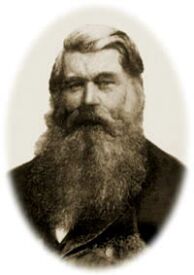Joseph Wilson Swan
| Sir Joseph Swan | |
|---|---|

Photograph of Swan, c. 1900
|
|
| Born | Joseph Wilson Swan 31 October 1828 Bishopwearmouth, Sunderland England |
| Died | 27 May 1914 (aged 85) Warlingham, Surrey England |
| Nationality | British |
| Fields |
Physics Chemistry |
| Known for |
Incandescent light bulb Photographic process |
| Notable awards |
Hughes Medal (1904) Albert Medal (1906) |
Sir Joseph Wilson Swan, D.Sc.h.c., FRS (31 October 1828 – 27 May 1914) was a British physicist and chemist. He is known as an independent early developer of a successful incandescent light bulb and is the person responsible for developing and supplying the electric lights used in the world's first homes and public buildings (Savoy Theatre in 1881) to be lit with electric light bulbs.
In 1904 Swan was knighted by King Edward VII, awarded the Royal Society's Hughes Medal, and was made an honorary member of the Pharmaceutical Society. He had received the highest decoration in France, the Légion d'honneur, when he visited an international exhibition in Paris in 1881. The exhibition included exhibits of his inventions, and the city was lit with his electric lighting.
Swan was the maternal grandfather of Christopher Morcom,Alan Turing's close friend and first love during their studies at the Sherborne boarding school.
Joseph Wilson Swan was born in 1828 at Pallion Hall in Pallion in the Parish of Bishopwearmouth, Sunderland, County Durham. His parents were John Swan and Isabella Cameron. He was said to have had an enquiring mind even as a child. He augmented his education with a fascination of his surroundings, the industry of the area and reading. He attended lectures at the Sunderland Atheneum. He later became a partner in Mawson's, a firm of manufacturing chemists in Newcastle upon Tyne, started by John Mawson (9 Sep 1819 – 17 December 1867) the husband of his sister, Elizabeth Swan (22 Nov 1822 – 2 August 1905). This company existed as Mawson, Swan and Morgan until 1973, formerly located on Grey Street in Newcastle upon Tyne near Grey's Monument. The premises are now occupied by hamburger chain Byron and can be identified by a line of Victorian-style electric street lamps in front of the store on Grey Street. Swan lived at Underhill, Low Fell, Gateshead, a large house on Kells Lane North, where he conducted most of his experiments in the large conservatory. The house was later converted into a private fee paying, grant aided co-educational grammar school named Beaconsfield School. Here, students could still find examples of Swan's original electrical fittings.
...
Wikipedia
